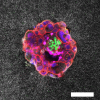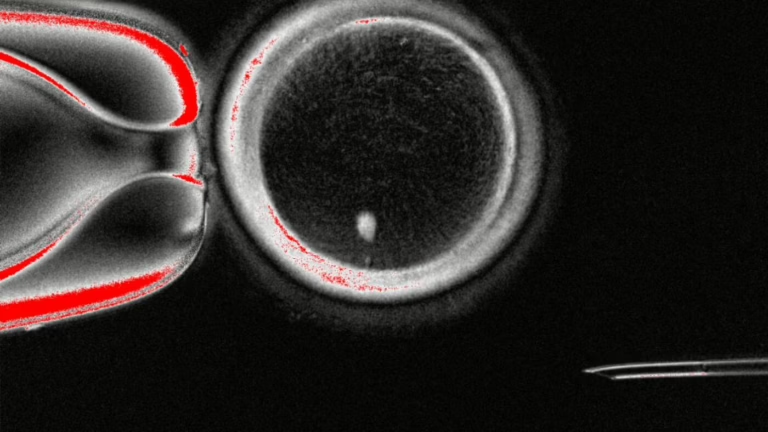Depicted here is a human egg whose original DNA has been substituted with genetic material from an adult skin cell.
Mitalipov laboratory
hide caption
toggle caption
Mitalipov laboratory
Researchers have successfully engineered human eggs that incorporate genetic information derived from adult skin cells. This breakthrough could one day enable women facing infertility or same-sex couples to have children genetically related to them, though it also introduces complex ethical, societal, and legal challenges.
“This represents a major advancement,” states Shoukhrat Mitalipov from Oregon Health & Science University in Portland, who spearheaded the study published in Nature Communications.
Many women are unable to conceive using their own eggs due to age or medical conditions. Consequently, scientists worldwide-including teams in Japan and U.S. biotech firms-have been exploring ways to generate human eggs in laboratory settings that carry the genetic makeup of individuals struggling with infertility. This emerging field is known as in vitro gametogenesis (IVG).
“This innovation could provide countless women the opportunity to produce eggs genetically their own, allowing them to have children biologically related to them,” Mitalipov explains.
Unlike the prevalent methods, Mitalipov’s group employed a distinct approach.

Typically, scientists convert adult cells like skin or blood into induced pluripotent stem (iPS) cells, then attempt to guide these iPS cells to develop into eggs or sperm. However, the most advanced human egg cells produced this way remain immature and incapable of fertilization.
In contrast, Mitalipov’s team adapted the cloning method used to create Dolly the sheep: they extracted nearly all DNA from a healthy donor egg and replaced it with DNA from a skin cell of another woman.
They then manipulated the egg to bypass the usual cell division processes-mitosis and meiosis-and instead induced a novel division process they named “mitomeiosis.” This technique yielded 82 viable eggs, according to their report.
To test functionality, the team fertilized these eggs with sperm, observing that approximately 9% of the embryos reached the blastocyst stage, the developmental phase suitable for uterine implantation.

Challenges and Ethical Considerations Surrounding IVG
Despite these promising results, none of the embryos were deemed suitable for implantation due to persistent genetic defects that would hinder normal development.
Mitalipov remains optimistic about overcoming these hurdles, while other researchers continue to explore alternative methods to achieve similar outcomes.
Experts in the field have lauded the progress. Dr. Sigal Klipstein, a reproductive endocrinologist affiliated with the American Society of Reproductive Medicine, remarks, “This is a pivotal advancement toward the future possibility of generating egg cells from skin cells for human reproduction, pending confirmation of safety and efficacy. The concept itself is truly compelling.”
If perfected, IVG could extend beyond aiding infertile women. For instance, it might enable same-sex couples to have children genetically linked to both partners by creating eggs from one male partner’s skin cells and fertilizing them with sperm from the other.
“The potential impact is enormous,” Mitalipov emphasizes.
However, some scientists caution that the genetic irregularities observed in these embryos raise doubts about the feasibility of this approach.
Amander Clark, a molecular and developmental biology professor at UCLA, notes, “It remains uncertain whether bypassing meiosis in half of the genome is compatible with human development. Only time and further fundamental research will provide answers.”
Navigating the Ethical Landscape
Even if technical challenges are resolved, IVG introduces profound ethical dilemmas. Critics worry it could pave the way for “designer babies,” where parents select specific traits such as intelligence, athleticism, or artistic ability.
Stanford bioethicist Hank Greely, author of The End of Sex and the Future of Human Reproduction, explains, “There may be attempts to use this technology for enhancement purposes-to engineer embryos with superior physical or cognitive traits. Opinions on this vary widely, with some viewing it as alarming and others as exciting.”
Another concern is the potential misuse of genetic material. For example, someone could theoretically obtain a skin cell from a public figure without consent and create a child carrying that person’s DNA.
“We might see ‘celebrity babies’ created without permission. While speculative, it’s not outside the realm of possibility,” says Ronald Green, a bioethicist at Dartmouth College. “This promising technology also raises serious ethical questions.”
There is also the unusual prospect of producing a “uni-baby,” a child derived entirely from one individual’s genetic material.
Greely comments, “It’s an odd scenario. Would anyone want to do that? Given the diversity of human personalities and resources, it’s hard to rule out.”
Despite these concerns, many experts advocate for continued research under strict ethical oversight.
“If proven safe, this technology could offer hope to millions worldwide longing for genetically related children,” Greely concludes.

















